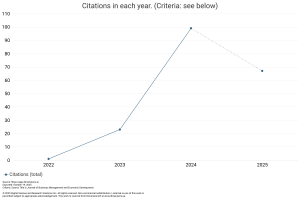Analysis of Contribution and Effectiveness of Local Taxes and Levies on Southeast Sulawesi Revenue
DOI:
https://doi.org/10.59653/jbmed.v2i02.839Keywords:
Contribution, Effectiveness, Regional Taxes, Levy, PADAbstract
The research aims to assess the contribution of local taxes and levies to Southeast Sulawesi Province's original income and evaluate their effectiveness. Utilizing quantitative descriptive research, findings indicate a consistent high contribution of local taxes from 2018 to 2022, ranging between 98.99% to 99.25%. This demonstrates their significant role in surpassing the 90% mark, thus positively impacting the province's Original Income. Conversely, levies exhibit unsatisfactory performance during this period, with contributions declining notably, hitting a low of 0.01% in 2022. In terms of effectiveness, local taxes consistently surpassed the 100% mark from 2018 to 2021, showcasing successful revenue targets attainment. Although a slight dip occurred in 2022 to 95.81%, local taxes remained effective. Conversely, levies demonstrated exceptional effectiveness in 2018 and 2019, exceeding 120%, indicating proficient management and surpassing revenue targets. The reciprocal relationship between the government and the people, as per stakeholder theory, underscores how effective tax management influences the province's welfare. The positive correlation between local taxes, levies, and regional income stems from improved tax collection principles enforced by stakeholders. In conclusion, while local taxes significantly contribute to regional income, effective levy management is crucial. This study underscores the importance of leveraging tax resources for societal welfare, highlighting the need for continuous evaluation and improvement in tax management strategies.
Downloads
References
Ersita, M., & Elim, I. (2016). Analisis efektivitas penerimaan retribusi daerah dan kontribusinya terhadap peningkatan pendapatan asli daerah (pad) di provinsi Sulawesi Utara. Jurnal EMBA: Jurnal Riset Ekonomi, Manajemen, Bisnis dan Akuntansi, 4(1).
Faoziyah, U., & Salim, W. (2020). Seeking prosperity through village proliferation: An evidence of the implementation of village funds (Dana Desa) in Indonesia. Journal of Regional and City Planning, 31(2), 97-121.
Husein, H. (2021). Analisis Efektivitas, Kontribusi Pajak Daerah dan Retribusi Daerah (Studi Pada 11 Kabupaten/Kota di Provinsi Maluku). Accounting Research Unit (ARU Journal), 2(2), 1-10.
Machmud, M. (2014). Analisis Kinerja Keuangan Daerah Di Provinsi Sulawesi Utara Tahun 2007-2012. Jurnal berkala ilmiah efisiensi, 14(2).
Mafaza, W., Mayowan, Y., & Sasetiadi, T. H. (2016). Kontribusi Pajak Daerah dan Retribusi Daerah Dalam Pendapatan Asli Daerah. Jurnal Perpajakan (JEJAK), 11(1).
Mapparenta, M. (2023). Contribution of Regional Original Revenue to Regional Revenue and Expenditure Budget. Advances in Economics & Financial Studies, 1(1), 36-50.
Mardiasmo. 2011. Perpajakan, Edisi Revisi 2011. Yogyakarta: Andi. Pajak, Direktorat Jenderal Pajak
Putri, M. E., & Rahayu, S. (2015). Pengaruh Pajak Daerah Dan Retribusi Daerah Terhadap Pendapatan Asli Daerah (Studi Kasus pada Pemerintah Daerah Kabupaten Cirebon Tahun Anggaran 2010-2014). eProceedings of Management, 2(1).
Putri, Y. L., Nuraini, A., & Nuraini, A. (2021). Pendapatan Asli Daerah: Apakah Pajak Daerah Berkontribusi? (Doctoral dissertation, Syiah Kuala University).
Ramadhan, P. R. (2019). Pengaruh Pajak Daerah Dan Retribusi Terhadap Pendapatan Asli Daerah Kabupaten/Kota Di Sumatera Utara. Jurnal Akuntansi Dan Bisnis: Jurnal Program Studi Akuntansi, 5(1), 81-87.
Wijayanti, S. N. (2016). Hubungan antara pusat dan daerah dalam negara kesatuan Republik Indonesia berdasarkan Undang-Undang Nomor 23 Tahun 2014. Jurnal Media Hukum, 23(2), 186-199.
Downloads
Published
How to Cite
Issue
Section
License
Copyright (c) 2024 Nurhayati, Buyung Sarita, Salma Saleh

This work is licensed under a Creative Commons Attribution-ShareAlike 4.0 International License.
Authors who publish with this journal agree to the following terms:
- Authors retain copyright and grant the journal right of first publication with the work simultaneously licensed under a Creative Commons Attribution-ShareAlike that allows others to share the work with an acknowledgement of the work's authorship and initial publication in this journal.
- Authors are able to enter into separate, additional contractual arrangements for the non-exclusive distribution of the journal's published version of the work (e.g., post it to an institutional repository or publish it in a book), with an acknowledgement of its initial publication in this journal.
- Authors are permitted and encouraged to post their work online (e.g., in institutional repositories or on their website) prior to and during the submission process, as it can lead to productive exchanges, as well as earlier and greater citation of published work (See The Effect of Open Access).





























